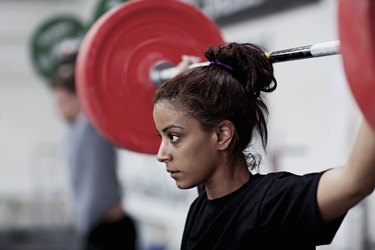
During the off-season, when competitions are in the distant future, most bodybuilders go on a "bulking cycle" in which they try to add as much muscle mass as possible. Bulking is necessary if you want to develop your physique, although one consequence of bulking is short-term fat gain. But there are strategies you can use to minimize the bulking belly fat accumulation.
Consume More Calories
Video of the Day
When bulking, you need to consume more calories than you burn, so that your body has the energy needed to build muscle. However, it's very easy to make the mistake of thinking more calories equals more muscle gain. In reality, your body builds muscle at a steady rate, so more calories leads to more fat gain.
Video of the Day
You can use an online calorie calculator or an app on your phone or wearable to find your ideal calorie intake for muscle gain. There is a myth, or trap if you want to get real about it, that recommends eating 5,000 to 6,000 calories per day. Not real. Because most people can gain muscle on between 3,200 and 4,000 calories.
Consume Less Processed Food
During contest season, the typical bodybuilding diet consists of foods such as chicken, rice, broccoli, oats and fish. However, when bulking after such a strict dieting phase, it is very tempting to turn to processed foods to get your calories in.
Foods high in refined carbohydrates, trans fats and additives are very easy to overeat, and where they play no useful role in the body, are more likely to be stored as fat.
While your diet doesn't need to be 100 percent strict when bulking, base it around nutrient-dense healthy foods like meat —chicken breast, turkey breast and fish recommends Powerlifting Belts — fruits, vegetables, nuts and whole grains. If you're new to bulking, protein is needed much more to build your muscles. But when you're the size you want to be, protein is consumed as a maintenance macro at 0.37 grams for every pound you weigh says the Academy of Nutrition and Dietetics.
Cardio While Bulking
If you do find that you're putting on too much stomach fat, you can reduce your calorie intake. However, this may leave you feeling hungry, tired and lethargic, so a better option is to increase your energy expenditure. More weight training can cause fatigue and over-training, so adding extra cardiovascular work is your best bet.
Perform your cardio first thing in the morning on an empty stomach. Get up half an hour before breakfast three or four times per week, and go for a brisk walk, light jog, swim or cycle ride. Fasted cardio is said to burn more fat that carbohydrates reports American Council on Exercise.
Check Your Progress
It's virtually impossible to notice fat gain on a daily basis, so keeping regular measurements is important, to make sure you don't put on too much fat. Check your weight, measure the circumferences of your stomach and muscles, do skin fold measurements and take progress photos once every two weeks. This will give an accurate representation of your progress and allow you to make the necessary adjustments to your training and diet.